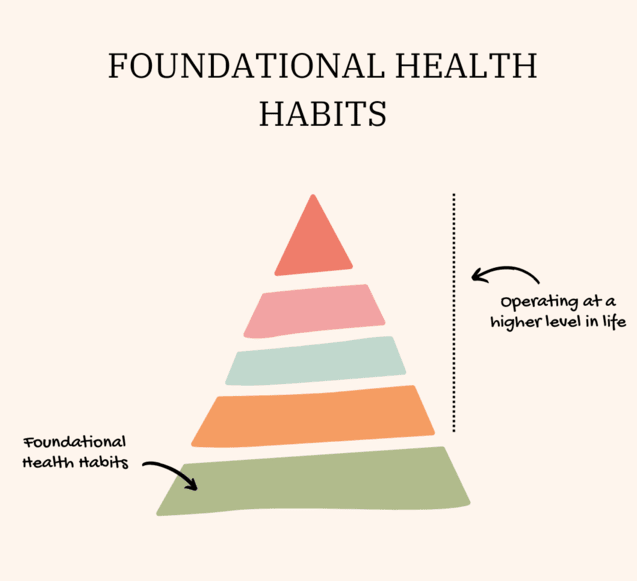Before we get stuck into June, I want to take a moment to recap my goals with foundational health habits for 2024.
I have two goals for 2024:
- Take the six foundational health habits I’ve mostly established (alcohol, sleep, protein, caffeine, water and steps) – and truly make them second nature. Whilst most of these are in a pretty good place, some are still fragile.
- Get whole foods (my newest foundational health habit) up to mostly 80% consistency and in the green. It doesn’t necessarily have to be second nature (as with the other six), But it would be good to get it up and around 80% consistency.
And therefore, a reminder of what my goals for June were:
- Alcohol, sleep, protein, caffeine, water and steps at 80% consistency and in the green
- Whole foods to be above 50% consistency again (it was above 50% for the first time in May) – preferably closer to 60% consistency.
Alright, lets jump in!:


As you can see, June was a REALLY strong month. I achieved both of my goals. My six habits were at least 80% consistency and in the green, and whole foods was above 50% (53%). That’s exactly where I wanted to be.
Let’s dive into the detail:
No Alcohol
100%, of course. I’m nearly three years sober 🙂
Sleep – 6.5 hours
Sleep came in at 87%. That’s a small Improvement from May, and now six consecutive months in the green. That’s awesome to see. And it reflects the fact that I’m finding sleep a little easier to keep over 80% lately.
Ultimately, anything over 80%, and preferably with no double misses, is what I’m looking for. And June was exactly that, so we’re good.
Protein – 175 grams
Protein landed right on the nose at 80%.
I’m probably always going to find myself with a handful-ish of days throughout the month where I struggle to get 175 grams of protein in. It’s usually around a trip, a low protein dinner, or simply a lack of planning.
By the way, even when I miss my protein number on a given day, my average for the week is usually around 180-190 grams. So, it’s not the biggest thing in the world if I’m hanging around 80% consistency.
That said, it’s really useful to hold myself accountable to seeing 80+5 consistency, with no more than six misses in a month. Because, more misses would easily become a slippery slope to an average below 175 grams.
Caffeine – max two cups, and before midday
Caffeine, like protein, came in at 80% consistency.
Caffeine is likely to always come in at around 80%. And that’s because all of my misses are an intentional miss – usually enjoying an afternoon coffee on a trip, or to fuel a later than usual workout.
So, 80% consistency, with no double misses is exactly where I like to be!
Water – 3 litres
87% for water. No double misses.
I’ve also been reaching my goals of 3 litres of water much more smoothly recently – usually getting it in by 8PM ish (important to avoid night time toilet visits!).
So, super happy with water.
10K Steps
I found steps a bit of a struggle in June. I scraped in at 80% consistency, and also managed a double miss, which I don’t like to see.
What causes me to miss my step goal? Mostly, bad weather or poor planning. The poor planning part is what I need to focus on. I often leave getting a start on my steps too late in the day, which leaves me open to the miss.
So, in July, I need to focus on 1. having a plan, and 2. breaking the back of the 10K steps as early in the day as possible.
Whole Foods – 80%
Whole foods came in at 53% consistency – about the same as last month.
That was my goal, so I’m happy with that. This now really sets a benchmark for me to improve upon. The second half of the year is really about keeping consistency above 50%, and slowly nudging things into the 60% and the 70% area. And, hopefully towards 80% consistency and in the green for the end of the year.
Importantly, I’ve been making real strides on a day-to-day basis in making better, conscious decisions around the food I’m putting into my mouth.
.
So, I’m happy with 53% consistency. I still feel very vunerably when it comes to eating 80% whole foods each day, and I’m not completely convinced I will never see a drop below 50%. But, what’s important is that it’s all heading in the right direction. And that’s exactly what I need for now.
Wrap Up
I’m really, really happy with June. It was an incredible month.
Six of the habits that I expected to be 80% consistency or above, were. And my seventh habit (whole foods) stayed above 50% consistency. So, I achieved both of my goals for June.
Overall, 2024 is shaping up to be a great year. More greens, less oranges, and hopefully no reds from here.
My goals for July
My goals for July are exactly the same as they were for June.
- Alcohol, sleep, protein, caffeine, water and steps at 80% consistency and in the green
- Whole foods to be above 50% consistency again (it was above 50% for the first time in May) – preferably closer to 60% consistency.
I will see you next month!
Get my ideas straight to your inbox. Sign up for my newsletter below:










